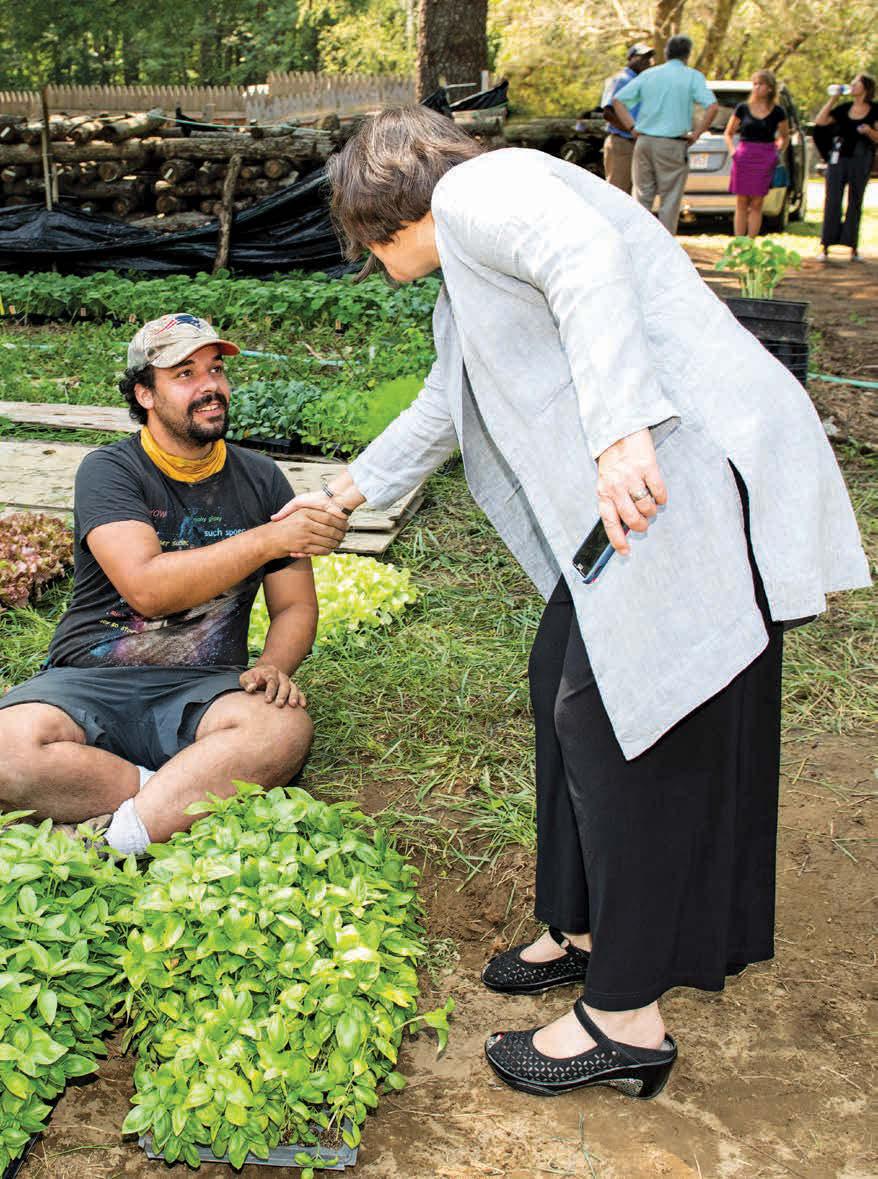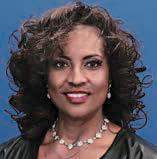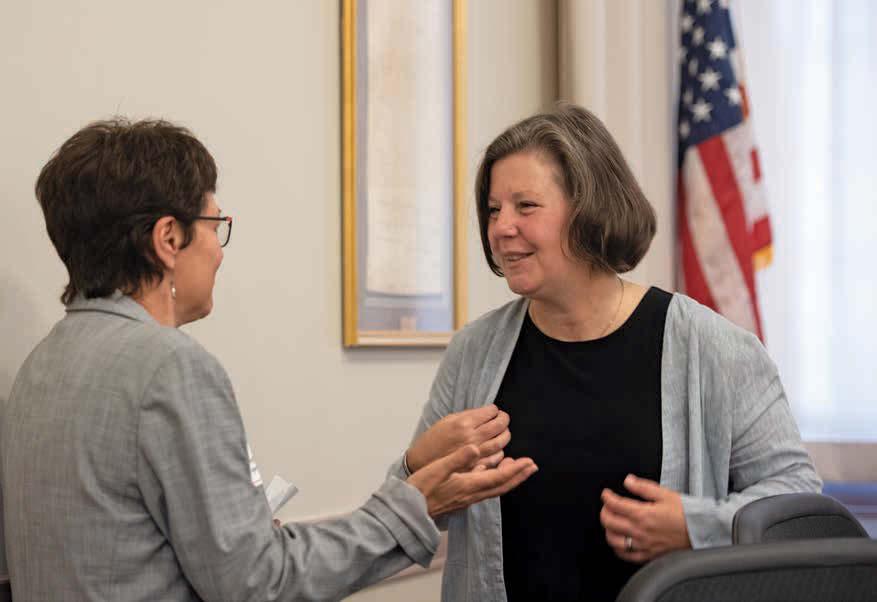
6 minute read
From Clinic to Campaign Trail
FROM CLINIC TO CAMPAIGN TRAIL
Politics informed by social work
BY MEGAN RUBINER ZINN PHOTOS BY SHANA SURECK

Massachusetts State Senator Jo Comerford, M.S.W., tours ServiceNet’s Prospect Meadow Farm in Hatfield, MA, which employs more than 70 people with intellectual disabilities or autism while providing them with an education focused on agriculture.
A degree in social work is an obvious launching point for many careers, among them psychotherapy, social services, community organizing, nonprofit management. And surprisingly, even politics. While not expected, it’s another natural fit. Social workers bring to the political sphere a passion for working on behalf of communities in need, thorough knowledge of the way people think and behave and a keen understanding of the complex ways that policies impact communities and individuals.
“You’d be surprised to find how many people in the legislature are social workers,” observed Jo Comerford, Massachusetts state senator and long-time Smith College School for Social Work adjunct faculty member. “There’s a band of people who know each other as social workers and give a little nod to each other.”

Councilwoman Angelia Washington, M.S.W. ’03.
Comerford is among a number of SSW-related social workers whose career paths have led them to politics and public service. While Comerford holds a full-time political position, Jim Wayne, M.S.W. ’78, Angelia Washington, M.S.W. ’03, and Tracye Polson, Ph.D. ’05, have all continued in their primary occupations while pursuing or serving in office.
Before running for office, Wayne built a large employee assistance program and a private psychotherapy practice in Louisville, Kentucky. After a life steeped in politics, Wayne decided to run for a seat in the Kentucky General Assembly to have an influence on the way policies affect individuals and communities. With a legislature that only meets part time, he was able to serve from 1991 to 2019 while still maintaining his practices.

Representative Jim Wayne M.S.W. ’78 engages an audience.
During his tenure in the House, Wayne’s priorities included creating more stringent requirements for university crime reporting, preventing child sexual abuse and improving protections for survivors, developing an affordable housing trust and encouraging tax reform. In recent years, Wayne has built, with the help of Smith associates, the Institute for Advanced Psychotherapy at Bellarmine University to bring SSW-level quality social work training to Louisville.
Washington, who also holds degrees in nursing and education, has run a health science program for the Department of Defense at Camp LeJeune High School in her hometown of Jacksonville, North Carolina, since 2010. Soon after resettling in Jacksonville, a group of people encouraged her to run for the city council, drawn by her professional credentials and past experience living in larger metropolitan areas. Inspired to stand up for people in her community, she ran successfully in 2011 and has served on the council ever since.

Tracye Polson, Ph.D. ’05, and friend Geoffrey Locke, M.S.W. ’98, Ph.D. ’11, on the campaign trail.
In her second year on the council, Washington joined the National League of Cities, an organization of elected officials that makes recommendations on national policies and lobbies legislators. She began by serving on the NLC’s committee on Human Development and its Council on Youth, Education, and Families. After one year, she became vice chair of the Human Development Committee, and last year was elected to the NLC’s board of directors.
Polson is a clinical social worker in private practice in Jacksonville, Florida. After the 2016 presidential election, she became increasingly interested in politics, particularly knowing the impact of policy on communities and individuals. Distressed that no Democrat had run for her district’s State House seat for six years, she decided to throw her hat in the ring in 2018. While Polson did not win that election, she lost by an extremely narrow margin. She may decide to run again, but meanwhile, she continues her clinical practice and advocates for issues like public education, while supporting women running for state offices.
Although Comerford worked in mental health early in her career, she has spent most of it in community organizing and nonprofit management, most recently as a campaign director for MoveOn. She also served as a SSW practicum advisor and taught in the Agency and Community Practice sequence until 2016.

Jo Comerford greets Mindy Domb, State Representative, 3rd Hampshire District, at Amherst City Hall.
In most of her positions, Comerford worked closely with elected officials and had long considered running for office. In 2018, when the Senate seat for the Hampshire, Franklin and Worcester regions of Massachusetts became available, Comerford mounted a write-in campaign, won the Democratic primary and ran unopposed in the general election. Since taking office in January 2019, Comerford’s priorities have included constituent casework, public school funding, healthcare reform, environmental protection and expanding public transit and revenue.
GRASPING THE BIG PICTURE
Social workers like Wayne, Washington, Polson and Comerford bring particular skills and perspectives to the public sector. From years of experience in clinical settings and advocacy work, they understand the challenges that individuals face and the effects of social policy on individuals. “We deal with larger contexts, the individual or the family system, the social network and the culture that we live in,” Wayne said. “We know that policy is important in shaping individual lives and promoting mental and societal health.”
Comerford particularly sees how this perspective affects her constituent work. “If someone comes to our team with the story of being treated badly by a landlord, for example, we all go at that problem,” she explained. “But the team also has the bigger picture— housing analysis or the shortage of affordable housing.”
Social workers’ education in community organizing also benefits politicians, both in their ability to campaign and to enact change. Right after taking office, Wayne helped constituents successfully organize for fair compensation when a Louisville airport expansion threatened their property values. “That was the community organizing that I learned at Smith in the social policy sequences,” he said. Experience in community organizing is also a foundation for coalition building among politicians. “Organizing is about r elationships. It’s about building a shared vision, a shared goal and a shared stake in the outcome,” Comerford explained.
BRINGING SOCIAL WORK SKILLS TO PUBLIC INTERACTIONS
With years of clinical experience, these public servants are also able to read people and connect more easily with them. According to Wayne, understanding his colleagues’ personalities and needs helped him approach them around legislative issues and know what arguments or perspectives would be effective.
Social workers’ training helps them keep their personal feelings out of interactions, to avoid judgment and to show compassion. In Polson’s words, her social work training taught her about “holding open a particular space in my mind to be able to meet people where they are… to hold on to my own humanity and the humanity of people that I meet.”
She recalled an interaction with a voter who asserted (regarding immigration) that the military should “shoot any man, woman or child coming into our country.” She was able to respond without anger but express her strong disagreement. “I wanted him to understand that I heard him, but in a very thoughtful, respectful way, be clear that I was not in alignment with that,” she said.
For Washington, keeping her own needs out of the process is a crucial part of the ethics of public service. “In social work we learn that first and foremost, you do no harm. You don’t go in with your own personal agenda at the expense of your citizens.”
MODELING HOW TO SPEAK UP
Being in the public eye has challenges for those in politics who continue their clinical work. Wayne and Polson, in particular, maintained clear boundaries between their practices and their public role so that it didn’t contaminate the therapy.
Polson, however, discovered a positive outcome among her patients as the result of her campaign. Seeing her use her voice in a public way inspired some to be more willing to use theirs. “They started talking about their voice and the ways in which they have felt silenced and not wanting to be quiet or to be careful, to take more risks,” she explained. “I think, watching me do it, there was an awareness they could start to apply to their own lives.” For any social worker, the political sphere gives them the opportunity to do the work they love, on a much grander scale, impacting far more people than they can individually. “I can help so many different people in so many genres of life, on many different playing fields. I’m impacting people’s lives locally and at state and federal levels,” Washington said. “But my ultimate goal is to be able to take my skills and impact the lives of people on a global level.” ◆








